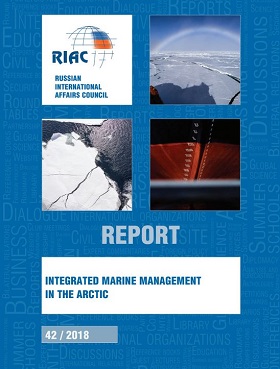On April 9, 2019, the ‘Arctic: Territory of Dialogue’ international forum opened in St. Petersburg. In terms of its size, the event is comparable to the largest forums held in Russia throughout the year, such as the St. Petersburg International Economic Forum (SPIEF), the Eastern Economic Forum (EEF), the Russian Competitiveness Summit (KEF) and the Russian Investment Forum (RIF).
One of the key goals of such events is to attract the attention of foreign businesspersons, politicians, public figures and scientists to cooperating with Russia. Given Russia’s size and diversity, these events are useful for Russian participants as well. This is particularly true for experts on the Arctic.
Today, the notions of international cooperation in the Arctic and global approaches to the region have become quite popular. However, is this interest supported by profound knowledge and understanding of the processes in the Arctic region? Do those who plan the development of international projects know each other well enough? And, most importantly, how much do we actually know about the natural, environmental and legal activities that each polar country carries out in the Arctic? This question also applies to experts commenting on Arctic issues. How comprehensive is the presentation of plans and motivations of non-regional actors, particularly those from East Asia, to participate in the Arctic exploration?
While states continue to play a significant and largely decisive role in developing the Arctic project, the public and expert communities are starting to play an increasingly important part in the processes of states decision-making and shaping national policies. Expert discussions have demonstrated that knowledge of the Arctic is fairly fragmented even in Arctic Council member countries, while an objective need to overcome this situation is growing.
Naturally, neighbouring Arctic countries are quite familiar with the challenges and specifics of working at the Far North. Among the Arctic Five, the United States is probably the only country whose citizens lack an “Arctic identity.” Over 50 per cent of Americans believe that the Arctic plays no, or virtually no role in shaping their national identity. To some extent, the activities of East Asian states such as China, South Korea, Japan, India and Singapore in relation to Arctic projects prompt the countries of the region towards more effective cooperation among themselves. One of the steps towards increasing the effectiveness of collaboration is an in-depth study of the foundations and potential of the Arctic activities of the region’s neighbours. The inaccessibility of research materials prepared by Arctic countries on their activities in the region to an international readership leaves the Arctic mostly unexplored. Careful study of national legal regulations on relevant Arctic zones is of primary importance in this area.
In accordance with this logic, RIAC, the International Law Department of MGIMO University under the Ministry of Foreign Affairs of the Russian Federation and the Fletcher School of Law and Diplomacy at Tufts University (United States) coordinated the publication in English of the third volume of RIAC’s anthology The Arctic: Issues in International Cooperation, which includes Russia’s key Arctic legislation and documents that determine the principles of international cooperation of the Arctic region states. Baseline of Russian Arctic Laws edited by professors Paul Arthur Berkman, Alexander N. Vylegzhanin and Oran R. Young, was published by the prestigious academic publishing company Springer.
On April 9, 2019, the ‘Arctic: Territory of Dialogue’ international forum opened in St. Petersburg. In terms of its size, the event is comparable to the largest forums held in Russia throughout the year, such as the St. Petersburg International Economic Forum (SPIEF), the Eastern Economic Forum (EEF), the Russian Competitiveness Summit (KEF) and the Russian Investment Forum (RIF).
One of the key goals of such events is to attract the attention of foreign businesspersons, politicians, public figures and scientists to cooperating with Russia. Given Russia’s size and diversity, these events are useful for Russian participants as well. This is particularly true for experts on the Arctic.
Today, the notions of international cooperation in the Arctic and global approaches to the region have become quite popular. However, is this interest supported by profound knowledge and understanding of the processes in the Arctic region? Do those who plan the development of international projects know each other well enough? And, most importantly, how much do we actually know about the natural, environmental and legal activities that each polar country carries out in the Arctic? This question also applies to experts commenting on Arctic issues. How comprehensive is the presentation of plans and motivations of non-regional actors, particularly those from East Asia, to participate in the Arctic exploration?
In this regard, it is crucial for the further development of the spirit of cooperation in the Arctic to strengthen the confidence infrastructure on the basis of disseminating reliable information about the region (including its countries and peoples), as well as about regional international agreements, prospective projects, the current rules of interaction and a responsible attitude to nature.
The Arctic Council works diligently in this area. The organization will soon celebrate its 25th anniversary, and this will coincide with Russia chairing the prestigious forum in 2021, taking over from follow Iceland, whose presidency is set to start in May 2019 following Finland. While states continue to play a significant and largely decisive role in developing the Arctic project, the public and expert communities are starting to play an increasingly important part in the processes of states decision-making and shaping national policies.
Expert discussions have demonstrated that knowledge of the Arctic is fairly fragmented even in Arctic Council member countries, while an objective need to overcome this situation is growing. New participants in the Arctic dialogue, as well as the regional players first and foremost, are interested in an broad discussion of plans to develop tourism, navigation and freight carriage and carry out joint scientific work in the Arctic. In some cases, this interest becomes truly collaborative. Even U.S.–Russia relations in this area are quite constructive, as proven by recent examples.
In May 2018, the International Maritime Organization approved the joint U.S.–Russia proposal for the routes along the Bering Strait and the Bering Sea. The measures that were developed went into effect on December 1, 2018 and became the first internationally recognized rules of polar navigation in the context of the Polar Code that came into effect since 2017. The rapprochement between Russia and the United States was made possible by the compelling need recognized by both countries to regulate the intensified navigation in the environmentally vulnerable Bering Strait.
Another example is the development of academic contacts between Russian and American scientists studying the Arctic. On March 12, 2019, representatives of the Russian Academy of Sciences and the National Academy of Sciences in the United States signed an agreement in Washington on cooperation in scientific, engineering and medical research. One of the areas of the future joint research is the impact of climate change on permafrost and the ice in the Arctic Ocean.
Naturally, neighbouring Arctic countries are quite familiar with the challenges and specifics of working at the Far North. Among the Arctic Five, the United States is probably the only country whose citizens lack an “Arctic identity.” Over 50 per cent of Americans believe that the Arctic plays no, or virtually no role in shaping their national identity.
Against this background, China’s statement declaring itself a “Near-Arctic state” increases the concern of regional countries about preserving the existing status quo in the regional mechanisms for discussing the management of the Arctic.
To some extent, the activities of East Asian states such as China, South Korea, Japan, India and Singapore in relation to Arctic projects prompt the countries of the region towards more effective cooperation among themselves. One of the steps towards increasing the effectiveness of collaboration is an in-depth study of the foundations and potential of the Arctic activities of the region’s neighbours. The inaccessibility of research materials prepared by Arctic countries on their activities in the region to an international readership leaves the Arctic mostly unexplored.
Careful study of national legal regulations on relevant Arctic zones is of primary importance in this area. In this respect, the previously noted role of expert communities could become a condition sine qua non for such work. In accordance with this logic, RIAC, the International Law Department of MGIMO University under the Ministry of Foreign Affairs of the Russian Federation and the Fletcher School of Law and Diplomacy at Tufts University (United States) coordinated the publication in English of the third volume of RIAC’s anthology The Arctic: Issues in International Cooperation, which includes Russia’s key Arctic legislation and documents that determine the principles of international cooperation of the Arctic region states. Baseline of Russian Arctic Laws edited by professors Paul Arthur Berkman, Alexander N. Vylegzhanin and Oran R. Young, was published by the prestigious academic publishing company Springer.
It should be noted that the first translation of RIAC’s “Arctic” anthology into a foreign language appeared in Chinese in 2016.
The Compilers, editors and publishers believe that the access of professionals to translations of primary sources will improve the level of expert analysis of the Arctic, contribute to developing expert diplomacy, academic contacts and a constructive dialogue between states, and boost openness to Arctic cooperation, which has become the region’s key characteristic.
You can read the Preface and Introduction in English here.






